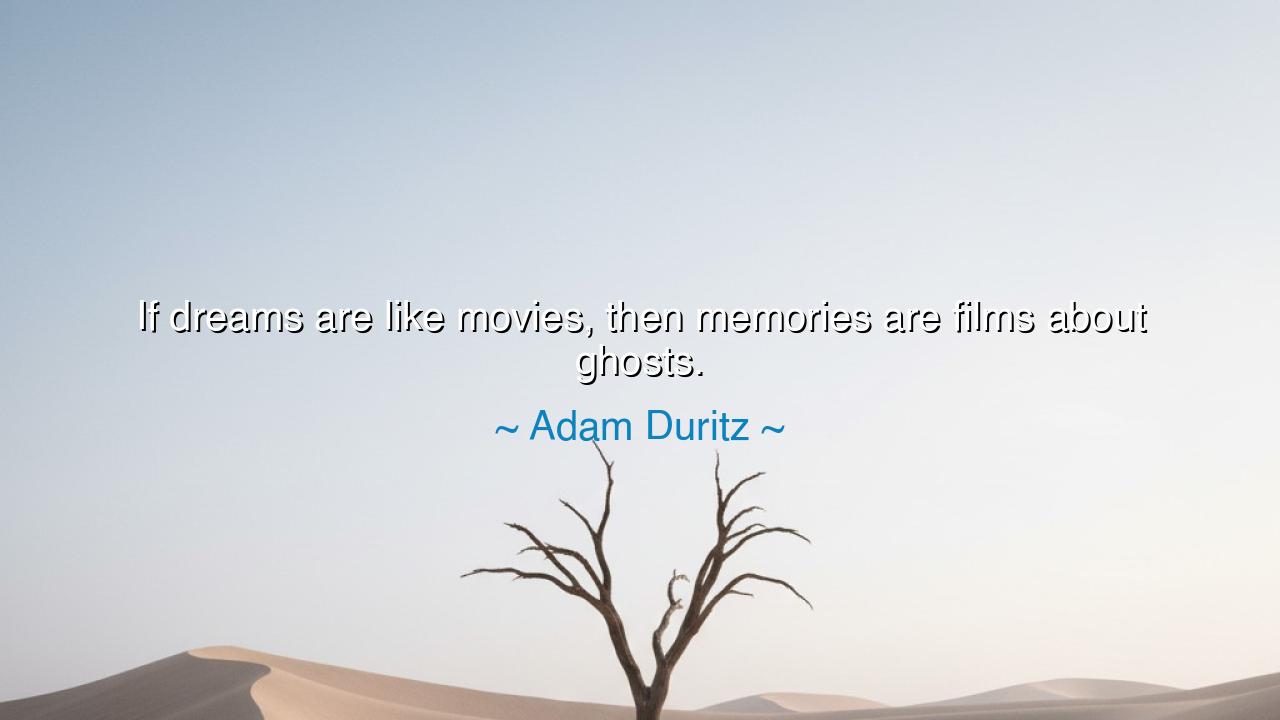
If dreams are like movies, then memories are films about ghosts.






In an age when songs still carried the ache of the human heart, the poet and musician Adam Duritz gave voice to a truth that haunts every soul: “If dreams are like movies, then memories are films about ghosts.” In these few words, he spoke not merely of art, but of existence itself — of how the mind, ever the great storyteller, plays and replays the reels of our lives, weaving illusion and longing into the fabric of our days. His lyric captures the dual nature of being human — that we are creatures of both hope and remembrance, of dreams that shape the future and memories that echo from the past.
In this metaphor, dreams are likened to movies — vibrant, imaginative, unfolding before us in the theater of possibility. They are projections of what could be, filled with color, movement, and light. Dreams carry the pulse of creation; they are alive, daring, forward-looking. They are born of desire, and in their making, we glimpse the divine power of imagination. But memories, Duritz tells us, are something different — they are films about ghosts. They play softly in the background of our minds, reminding us of what once was and will never be again. The people who populate them are shades of former selves — voices and faces that linger after time has taken them away.
To say that memories are films about ghosts is to acknowledge that we live surrounded by phantoms of our own making. Every recollection is a haunting, tender and sorrowful at once. We revisit the past not to change it, but to feel again the warmth that has faded, to hold once more what the river of time has carried from us. These ghosts are not evil; they are sacred — the remnants of love, loss, youth, and laughter. Duritz’s words are not a lament but a recognition: that to remember is to commune with the spirits of who we once were.
In the ancient world, the Greeks spoke of Mnemosyne, the goddess of memory, mother of the Muses. From her came all art, all storytelling, all remembrance. The ancients knew that memory was not static record but living spirit — a sacred bridge between the mortal and the eternal. It was through memory that heroes were immortalized, and through dream that destiny was born. Duritz, knowingly or not, speaks with this same ancestral wisdom: that the soul survives in the stories it tells itself, and that both dreams and memories are acts of creation, one pointing forward, the other looking back.
Consider the story of Anne Frank, whose diary transformed her fleeting, tragic life into a living dream that transcends death. Her words, written in fear and hope, have become both a dream of peace and a memory of suffering — a film about a ghost who still teaches the living. Her story reminds us that even when the body perishes, memory endures; it becomes the soul’s echo, speaking to future generations. Thus, in remembering others, we keep their ghosts gentle, luminous, and alive within the corridors of time.
But Duritz also offers a warning hidden within his poetry: to dwell too long among ghosts is to forget the living. The past, though precious, can ensnare us in its lightless beauty. We must honor our memories without becoming captives of them. The dream must lead us forward, while the memory must remind us where we came from. The wise heart keeps both in balance — dreaming boldly, remembering tenderly, and knowing that both are necessary to live fully.
Let this, then, be the lesson carried onward: cherish your memories, for they are the shadows of your soul’s journey, but do not mistake them for your destination. Visit them as you would an old friend — with reverence, but not with regret. And dream, always dream, for your dreams are the bright canvas upon which tomorrow is painted. The ghosts of yesterday will whisper, but let their whispers guide you, not chain you. For in the dance between what was and what may be, life itself finds its rhythm — a song of remembrance and renewal, sung forever beneath the silent stars.






AAdministratorAdministrator
Welcome, honored guests. Please leave a comment, we will respond soon